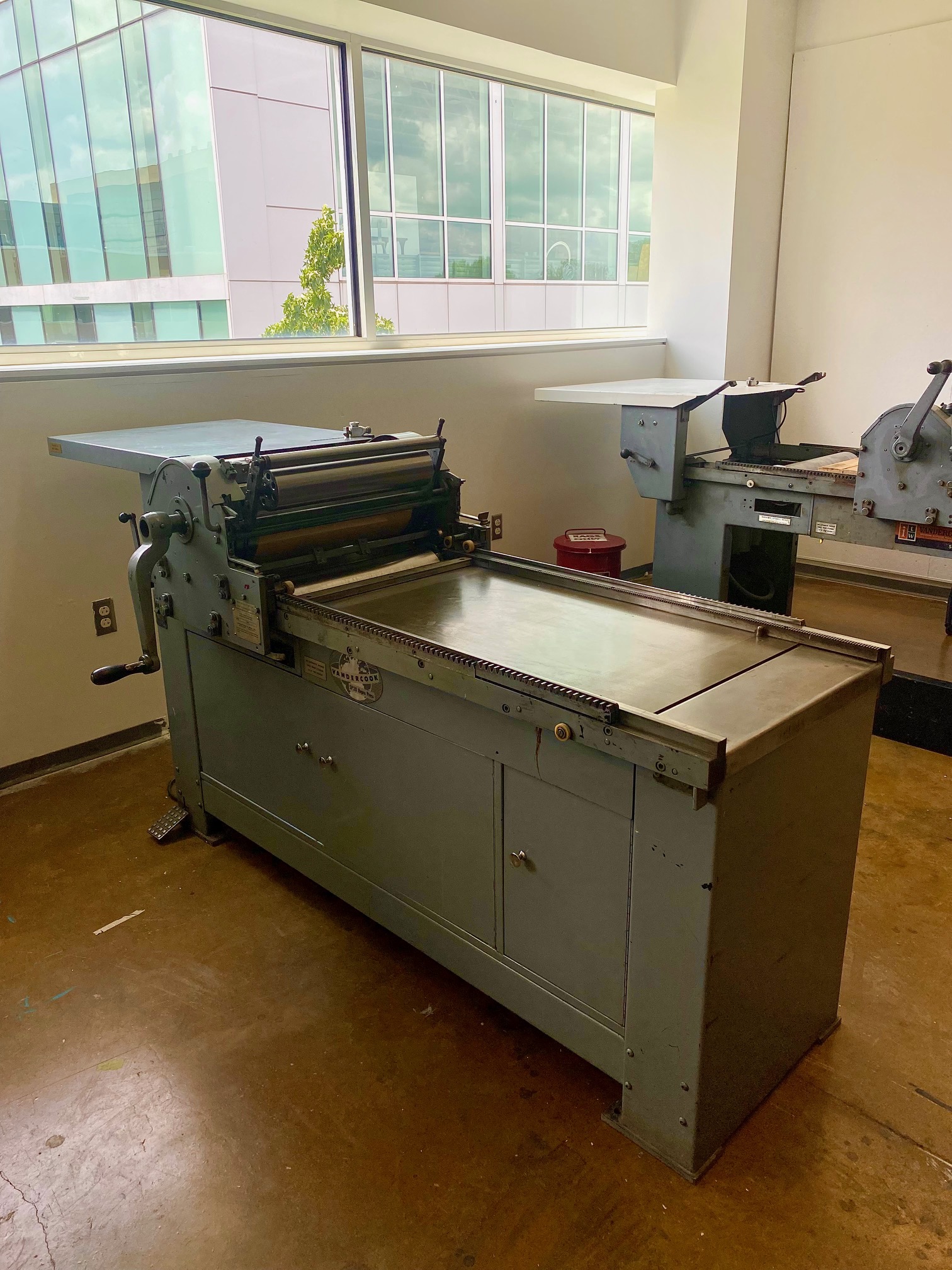A historic letterpress with a long educational legacy has found a new home in Tyler School of Art and Architecture’s printmaking studio. Through donations from dozens of Tyler alumni and supportive community members, the printmaking program met its goal to purchase an impeccably maintained Vandercook SP 20, currently being prepared for student use at the start of the fall semester.
The letterpress previously belonged to Mary Phelan, a retired professor who taught generations of students in the Book Arts & Printmaking MFA program at the University of the Arts.
“I moved to Philadelphia in 1981 with nothing in hand but a pica ruler and a job stick. Three months later, I had bought three Vandercook proof presses and 250 drawers of type for my own studio,” said Phelan, who continued to build an impressive collection of letterpress equipment and more than 650 drawers of type at UArts during her decades of teaching. Over the course of her career, she helped to develop graduate curriculum in book arts and served as a founding member of the College Book Art Association.
Phelan originally purchased her Vandercook from a Philadelphia shop where it was used for proofing. “The press was made in 1961 and had only been used by one person, so it was in really pristine condition,” she said. "I used it in my personal studio for twenty some years before it was moved to UArts where it was kept in a space for graduate students to use for their letterpress thesis work."
When UArts closed last June, Phelan had to quickly move the equipment off campus and into storage. Within the tight-knit Philadelphia printmaking community, it didn’t take long for word to spread that the press was in need of a new home. Rather than selling the equipment at auction, where it was likely to fetch a higher price in a private shop or collection, Phelan hoped to find a place where the letterpress would continue to be used in an educational capacity.
“I had less than a week to move it into storage, and I wanted to ensure it would go to someone who would appreciate it,” said Phelan.
While she was researching where to list the letterpress for sale, Phelan was contacted by Amze Emmons, Professor and Program Head of Printmaking, who she knew from their mutual service on the board of Second State Press, a nonprofit community printmaking studio. After talking with Emmons, Phelan felt assured that Tyler’s printmaking faculty would have the necessary skill and expertise to care for the equipment.
“Mary was very interested in the idea of continuing her legacy and worked with us closely throughout the process,” said Emmons.
That continuation came in the form of a successful alumni-backed fundraising effort this spring. The campaign to purchase the letterpress marked the first time that Tyler used OwlCrowd, Temple University’s official crowdfunding platform, which provides a space for members of the Temple community to collectively support campaigns. More than 60 individual donors contributed funds to secure the letterpress.
“The way the alumni came together for this was really heartwarming,” Emmons said. “A lot of small donations made a huge difference. Some of the contributors were recent graduates who probably don’t have a lot of extra income. That they gave at all really meant a lot.”
Tyler faculty are integrating the press into the curriculum, where it will enhance the school’s offerings in book arts and letterpress printing, starting with a book arts course taught by adjunct faculty Katie Garth, which will be the first to use the press exclusively. Tyler faculty are also exploring ways to integrate the letterpress into collaborative projects between printmaking and design. By using digital tools like Photoshop to create custom plates, students will be able to translate contemporary designs into prints made with the historic press.
The acquisition also opens the door to new partnerships across campus, including cross-disciplinary opportunities with English and creative writing classes.
“It's one of those funny things where this really old piece of technology is going to allow us to be more forward-thinking in some of our collaborations,” Emmons said.
“It was my life's work to build the letterpress studio and to teach. And to know that this equipment won’t be thrown out; that what I spent my life building will be continuing, in some way, that feels good,” said Phelan.

